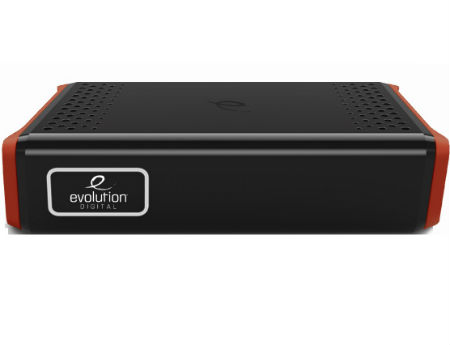TiVo Seeks Conditions On Buckeye’s STB Waiver Request
The smarter way to stay on top of the multichannel video marketplace. Sign up below.
You are now subscribed
Your newsletter sign-up was successful

A set-top waiver being sought by a relatively small cable operator is raising a sizable stink at the Federal Communications Commission.
While TiVo claims to be “supportive” of a waiver request from Buckeye CableSystem so long as it’s paired with multiple conditions, the MSO’s pursuit is also facing some outright opposition. Still, Buckeye’s pursuit does have the backing of the National Cable & Telecommunications Association.
Buckeye, an Ohio-based operator with 130,000 video subs, issued its waiver request on March 3, asking the FCC to bless a new QAM/IP hybrid set-top box that uses both integrated security and a downloadable form, claiming that the device would serve as the “linchpin” to an all-IP transition.
The box in question is to be made Evolution Digital (see image above) and outfitted with a downloadable security system developed by Azuki Systems, which is now part of Ericsson. As designed, the box would combine a unidirectional QAM-based digital transport adapter (DTA) with an IP video interface. The DTA side would rely on integrated encryption, while the IP portion would use the downloadable system. Because the device would use an integrated form of security, it needs a waiver that would allow it to sidestep the integrated security ban that took effect in July 2007.
Buckeye’s request comes after Charter Communications and Cablevision Systems requested, and were granted, FCC waivers allowing the use of dual-security setups that rely on integrated security systems and new downloadable versions.
TiVo Seeks Conditions
In comments filed March 27, TiVo sought conditions on Buckeye’s waiver while also urging the FCC to pursue new rules that would produce a successor to the CableCARD that could be applied to all multichannel video programming distributors, and not just cable operators. The cable industry has urged the FCC to kill the mandate altogether and to let market forces, not more government rules, decide the future.
The smarter way to stay on top of the multichannel video marketplace. Sign up below.
Among its desired conditions, TiVo wants Buckeye to “state categorically” that its “product would lack any storage capacity (including cloud storage), any connection to a device other than a display, and any other advanced functionality.” Further, TiVo said, Buckeye should be required to phase out its reliance on switched digital video (SDV) and ensure that retail devices can access all channels “without operator-supplied equipment.” Today, TiVo boxes require a separate Tuning Adapter device to receive channels delivered via SDV.
TiVo, which relies heavily on CableCARD technology today, argued that the FCC “should not embrace without proof the fiction that Buckeye’s ‘downloadable’ system would promise national interoperability comparable to CableCARDs.” Specifically, TiVo wants the FCC to hold off on a waiver until Buckeye shows how its IPTV system would interoperable with retail devices.
"We are supportive of Buckeye’s waiver request as long as some concerns are addressed,” Thomas Elam, TiVo’s vice president and general manager, U.S. operator business, said in a statement to Multichannel News, claiming that TiVo is seeking a “modest reduction in scope of the waiver.”
"Our primary concern is to ensure that there is a focus on a long term successor to CableCARD, while allowing operator like Buckeye to deliver a next generation HD-STB,” Elam added.
The Computer & Communications Industry Association also wants the FCC to create a CableCARD successor and is opposing Buckeye’s waiver request.
NCTA Backs Buckeye
In its comments, the NCTA said the FCC should grant the Buckeye waiver request and to reject TiVo’s “laundry list of conditions and restrictions that would sharply limit the benefit of the hybrid set-top,” including the ability to access network-based recordings or share content over home networks over secure links.
“TiVo’s response is to ask the Commission to erect a series of obstacles to Buckeye’s
waiver request, the net effect of which would likely be to scuttle Buckeye’s plans,” the NCTA wrote. “Arguably, TiVo is seeking these restrictions in order to steer Buckeye, and potentially other cable operators, towards use of a TiVo solution.”
In Buckeye’s follow-up comments, it held that that TiVo is attempting to bury the waiver request “beneath a stack of other TiVo-related proceedings…and unnecessary TiVo-centric conditions.”
Buckeye said the IP side of the hybrid box is application based, and uses the type of digital rights management technology that secured video on a variety of consumer devices, including laptops, mobile phones, and Roku boxes.
Buckeye stressed that TiVo’s SDV condition is unrelated to its waiver request, noting that it has committed to continued CableCARD support and to transition at least 85% of its video services to IP within 36 months of receiving a blessing for the proposed hybrid box.
Charter Communications also weighed in, because TiVo aims to reintroduce its issues with the Charter waiver to the Buckeye proceeding, noting that it is “highly motivated” to continue supporting CableCARDS to current or new TiVo customers. “They are still cable customers,” the MSO explained.
Charter also argued that the “Commission should not be selecting one universal ‘winning’ solution, nor should it halt consumer-friendly, cable innovation while it considers action.” On that point, it noted that the market did not embrace the FCC’s mandates for the CableCARD or the requirement to include an IEEE 1394 connector in every HD set-top.
